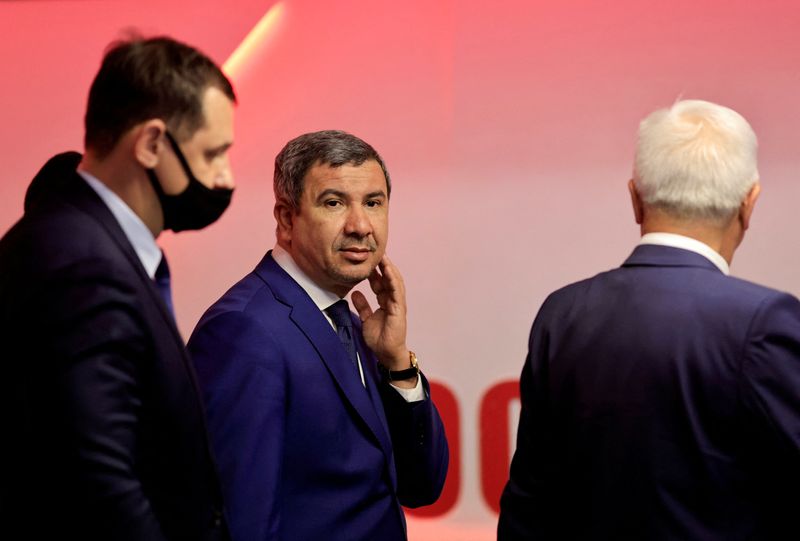
- All Instrument Types
- Indices
- Equities
- ETFs
- Funds
- Commodities
- Currencies
- Crypto
- Bonds
- Certificates
Please try another search

Iraq balks at greater Chinese control of its oilfields
 © Reuters. FILE PHOTO: Iraqi Oil Minister Ihsan Abdul Jabbar walks during a Lukoil energy event, in Baghdad, Iraq November 11, 2021. REUTERS/Thaier Al-Sudani
2/2
© Reuters. FILE PHOTO: Iraqi Oil Minister Ihsan Abdul Jabbar walks during a Lukoil energy event, in Baghdad, Iraq November 11, 2021. REUTERS/Thaier Al-Sudani
2/2
By Sarah McFarlane and Aref Mohammed
LONDON/BASRA (Reuters) - Iraq's oil ministry thwarted three prospective deals last year that would have handed Chinese firms more control over its oilfields and led to an exodus of international oil majors that Baghdad wants to invest in its creaking economy.
Since the start of 2021, plans by Russia's Lukoil and U.S. oil major Exxon Mobil (NYSE:XOM) to sell stakes in major fields to Chinese state-backed firms have hit the buffers after interventions from Iraq's oil ministry, according to Iraqi oil officials and industry executives.
Selling a stake to a state-run Chinese company was also one of several options being considered by Britain's BP (NYSE:BP), but officials persuaded it to stay in Iraq for now, people familiar with the matter said.
China is Iraq's top investor and Baghdad was the biggest beneficiary last year of Beijing's Belt and Road initiative, receiving $10.5 billion in financing for infrastructure projects including a power plant and an airport.
But when it comes to further Chinese investment in major oilfields, Baghdad has drawn a line in the sand.
Iraq's government and officials at state-run firms are concerned that further consolidation of fields in the hands of Chinese companies could accelerate an exodus of Western oil companies, a total of seven Iraqi oil officials and executives with companies operating in Iraq told Reuters in interviews.
Supported by state-run oil company officials, Iraq's Oil Minister Ihsan Abdul Jabbar dissuaded Lukoil last year from selling a stake in one of the country's largest fields, West Qurna 2, to Chinese state firm Sinopec (NYSE:SHI), three people familiar with the matter said.
Iraqi officials also intervened last year to stop Chinese state-backed firms buying Exxon's stake in West Qurna 1 and to persuade BP to stay in Iraq rather than offloading its interest in the giant Rumaila oilfield to a Chinese company, people familiar with the matter said.
Combined, Rumaila and West Qurna produce about half of the crude coming out of Iraq, which sits on the fifth-largest oil reserves in the world.
Iraq's oil ministry did not respond to requests for comment about the deals or the minister's role in any interventions.
The government worried that China's dominance could make Iraq less attractive for investment from elsewhere, two government officials said.
China's strengthening relationship with Iran has helped its position in Iraq due to Tehran's political and military influence there, but the oil ministry is wary of ceding more control over the country's key resources, some officials said.
"We don't want the Iraqi energy sector to be labelled as a China-led energy sector and this attitude is agreed by government and the oil ministry," another Iraqi official said.
RISKY STRATEGY
The interventions over BP, Exxon and Lukoil's positions in Iraq come after British oil major Shell (LON:RDSa) decided in 2018 to withdraw from Iraq's vast Majnoon oilfield.
The interventions also mark a shift in stance after Chinese companies won most energy deals and contracts awarded over the past four years. Iraqi oil officials said Chinese firms have accepted lower profit margins than most rivals.
"All the rules regarding tenders were formulated jointly by the Chinese and Iraqi sides and were conducted under transparent and fair principles," said state-owned China National Offshore Oil Corporation (CNOOC (NYSE:CEO)) in an emailed statement.
Pushing back against further Chinese investment is a risky strategy, though, as there's no guarantee others will step up and the government needs billions of dollars to rebuild the economy after the Islamic State insurgency was defeated in 2017.
Over the past decade, oil revenue accounted for 99% of Iraq's exports, 85% of the country's budget and 42% of its gross domestic product, according to the World Bank.
While oil majors jostled to get access to Iraq's vast oilfields after the U.S.-led invasion in 2003, they are increasingly focused on the energy transition and more profitable plays elsewhere. They also want better terms to develop fields, oil executives said.
China is among the biggest buyers of Iraq's crude and Chinese state firms have built up a dominant position in its oil industry.
But when Lukoil notified the government last summer that it was considering selling some of its stake in West Qurna 2 to Sinopec, the oil minister intervened, people familiar with the matter said.
It has not previously been reported that Sinopec was the potential buyer of Lukoil's stake. The Chinese company did not respond to a request for comment.
To encourage Lukoil to stay, Iraq offered a sweetener, a person with direct knowledge said.
A few months after Lukoil signalled it was considering a sale, Baghdad finally approved its plan to develop a field known as Block 10, where the Russian company had discovered an oil reservoir in 2017. Afterwards, Lukoil dropped the idea of selling its stake in West Qurna 2, the source said.
Lukoil did not respond to a request for comment.
BP AND EXXON
Over the past few years BP has also spoken to the government about its options - including leaving Iraq altogether - before settling on spinning off its stake in Rumaila into a standalone company last year, two people familiar with the matter said.
Oil minister Abdul Jabbar led efforts to convince BP not to leave as the government was concerned its partner in the field, China National Petroleum Corporation (CNPC), would buy BP's stake, the people said. Baghdad was also keen to keep such a high-profile international oil major in the country, they said.
BP declined to comment.
When Exxon flagged its intention to leave Iraq in January 2021, meanwhile, U.S. officials told Exxon they were unhappy with the prospect of the biggest U.S. oil major pulling out – for reasons that echoed Iraqi concerns.
State department officials said Exxon's departure could create a vacuum for Chinese companies to fill, a person familiar with the conversations said. U.S. officials then asked Exxon what it would take to stay in Iraq, the person said, declining to give further details.
A State Department spokesperson said: "We regularly engage with our Iraqi counterparts on fostering an environment conducive to private sector investment."
Exxon had signed an agreement for the sale of its interest in West Qurna 1 to CNOOC and PetroChina, the listed arm of CNPC, people familiar with the matter said.
Neither CNOOC nor CNPC responded to requests for comment about the deals.
Exxon's stake was valued at $350 million to $375 million, said people familiar with the matter. Iraq has veto power over oilfield deals, however, and did not approve the transaction.
Exxon filed for arbitration with the International Chamber of Commerce against Basra Oil Co., arguing that it had followed the terms of its contract for West Qurna 1 and had a good deal on the table, people familiar with the matter said.
The oil ministry then took the unusual step of trying to broker a deal on Exxon's behalf. The ministry offered Exxon's stake to other Western companies including Chevron Corp. (NYSE:CVX)
No one was interested. Rather than let the stake go to the Chinese companies, Baghdad said the state-run Iraq National Oil Company (INOC) would take it instead, though INOC is still in the process of being revived after being defunct for many years.
"(Exxon) will continue to work closely and constructively to reach an equitable resolution," said a spokeswoman.
SERVICE CONTRACTS
Iraq's oil industry is mostly based on technical service contracts between the state-backed Basra Oil Co. and foreign companies that are repaid costs plus a fee per barrel to develop fields, while Iraq retains ownership of the reserves.
Oil majors typically prefer deals that allow a share in profits rather than a set fee.
The priority for Chinese firms, however, is achieving secure oil supplies to feed China's growing economy, rather than returns for investors, said a Chinese oil executive with direct knowledge of CNPC's global investments.
There are some signs, however, that Iraq is attempting to make its terms more appealing.
France's TotalEnergies signed a $27 billion deal in September that included payment of 40% of revenue from one field. The deal has stalled, however, due to disputes over terms and it still needs approval from some Iraqi government agencies, Reuters reported in February.
TotalEnergies said it was fully committed to the project.
One oil company executive said they were sceptical Iraq would introduce more attractive terms. But unless they improve significantly, analysts say it is hard to imagine Iraq will be able to stem the exodus as the energy transition accelerates.
"Many of the energy majors are looking at the carbon emissions, their ability to generate cash flows if commodity prices are low, and they're looking at improving returns," said Ian Thom, research director at consultancy Wood Mackenzie. "As the priorities of the energy companies are changing, the relative attractiveness of Iraq is changing."
Related Articles
Are you sure you want to block %USER_NAME%?
By doing so, you and %USER_NAME% will not be able to see any of each other's Investing.com's posts.
%USER_NAME% was successfully added to your Block List
Since you’ve just unblocked this person, you must wait 48 hours before renewing the block.
I feel that this comment is:
Thank You!
Your report has been sent to our moderators for review






Add a Comment
We encourage you to use comments to engage with other users, share your perspective and ask questions of authors and each other. However, in order to maintain the high level of discourse we’ve all come to value and expect, please keep the following criteria in mind:
Enrich the conversation, don’t trash it.
Stay focused and on track. Only post material that’s relevant to the topic being discussed.
Be respectful. Even negative opinions can be framed positively and diplomatically. Avoid profanity, slander or personal attacks directed at an author or another user. Racism, sexism and other forms of discrimination will not be tolerated.
Perpetrators of spam or abuse will be deleted from the site and prohibited from future registration at Investing.com’s discretion.